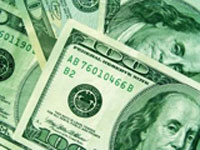Consumer confidence falls in USA
Rising gasoline prices and stock market turbulence undermined consumer confidence in March, increasing worries about one of the economy's pillars, a widely watched index showed on Tuesday.

The New York-based Conference Board said that its Consumer Confidence Index fell to 107.2, down from the revised 111.2 in February. Analysts had expected a reading of 109. The March index was the lowest since November 2006 when the reading was 105.3.
"Apprehension about the short-term future has suddenly cast a cloud over consumers' confidence," said Lynn Franco, director of the Conference Board Consumer Research Center, in a statement.
"The recent turmoil in financial markets coupled with the run-up in gasoline prices may have contributed to consumers' heightened sense of uncertainty and concern. The direction of both components over the next few months bears watching to determine whether this decline is just a bump in the road or something more substantial," she added.
Economists closely monitor consumer confidence because consumer spending accounts for two-thirds of all U.S. economic activity.
The Present Situation Index, which measures how shoppers feel now about economic conditions, increased slightly to 137.6 from 137.1 in February. The Expectations Index, which measures consumers' outlook in the next six months, declined to 86.9 from 93.8.
The report was a bit sobering for retailers and other businesses that rely on consumer spending.
The arrival of warmer weather this month - following an unusually cold January and February - has helped the nation's retailers catch up to a slow start to the spring selling season. But a slowing economy, particularly a weakening housing market, could challenge shoppers in the months ahead. Rising defaults and delinquencies in subprime mortgages and fewer home equity withdrawals that give consumers extra cash could curtail spending.
The latest report on housing, released Tuesday by Standard & Poors, further dimmed hopes for a rebound in the market. Prices of single-family homes across the nation depreciated in January compared to a year ago, the weakest results in more than 13 years, according to the S&P housing index.
The data underscored disappointing sales data released by the government on Monday that sales of new homes fell sharply for a second consecutive month in February. It also said that sales of new single family homes fell by 3.9 percent last month to a seasonably adjusted annual rate of 848,000, the slowest sales pace in nearly seven years.
The downbeat news on housing caused stocks to fall Tuesday as worries mounted that the nation's housing market may be slowing sharply enough to filter through the broader U.S. economy and dampen consumer spending, the AP reports.
Labor market conditions remain mixed.
Consumers saying jobs are "hard to get" increased to 19.1 percent from 17.9 percent. Those claiming jobs are "plentiful," however, increased to 30.5 percent from 27.8 percent in February. These statistics now stand at a five-and-a-half year high.
Consumers' short-term outlook turned more cautious in March. Those anticipating business conditions to worsen rose to 9.8 percent from 8.2 percent. Those expecting business conditions to improve decreased to 14.5 percent from 15.9 percent.
The outlook for the labor market was also more pessimistic. Consumers expecting fewer jobs in the months ahead increased to 16.5 percent from 14.2 percent. Those anticipating more jobs to become available declined to 12.7 percent from 13.3 percent. The proportion of consumers expecting their incomes to increase in the months ahead fell to 17.5 percent from 19.2 percent in February, Xinhua reports.
A preliminary survey by Reuters/University of Michigan released earlier this month showed sentiment fell to 88.8, a six-month low, from 91.3 in February. Another measure, the ABC News/Washington Post confidence index, posted its biggest decline since February 2004 for the week ended March 18.
So far, consumer spending, which accounts for more than two-thirds of the economy, continues to grow. Spending may expand at a 3.2 percent pace this quarter, compared with a 4.2 percent rate the previous three months, according to the median forecast of economists surveyed by Bloomberg News earlier this March. Spending has averaged 3.3 percent gains since 1990.
Still, increasing gasoline prices are having some effect. Retail sales rose less than forecast last month as higher fuel costs limited spending on other goods, a Commerce Department report earlier this month showed. Sales rose 0.1 percent following no change the prior month.
Fuel prices are up even more this month. The average price of a gallon of regular gasoline at the pump rose to $2.58 as of March 25, the highest since September, according to figures from the American Automobile Association. The average price this month is up 12 percent from February, Bloomberg reports.
Source: agencies
Prepared by Alexander Timoshik
Pravda.ru
Subscribe to Pravda.Ru Telegram channel, Facebook, RSS!




